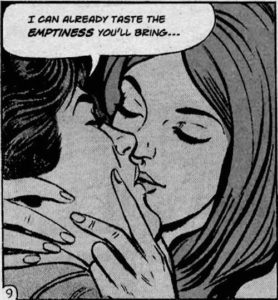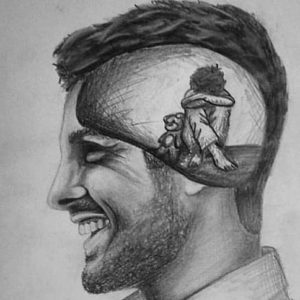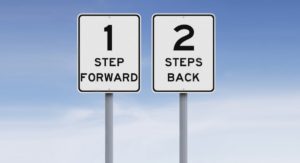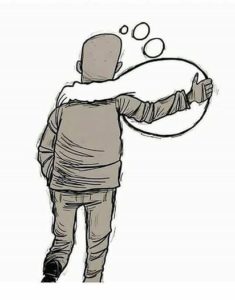You never noticed it, did you? That subtle transfer of power from yourself to your narcissist, giving him/her almost complete control over you and the relationship. That’s because they did it so deftly, so surreptitiously, it was almost as though we gave them that power, that control, without regard for what they would do with it. Well, in effect, we did. But only because we thought they would never do what they did – we trusted them. We believed that the bond we were building with them would be one that would last a lifetime. And why wouldn’t it? I mean, every time we looked at them, talked to them, spent time with them, it was as though we were  longingly leering into someone who was the other half of ourselves, wasn’t it? The more you shared with them, the more you got to know them, the more you realized you shared so many commonalities. It never dawned on us that we were handing them the knife that they would very soon repeatedly drive into our heart. You see, therein lies the foundation of a ubiquitous truth we all-too-often forget – betrayal never comes from an enemy.
longingly leering into someone who was the other half of ourselves, wasn’t it? The more you shared with them, the more you got to know them, the more you realized you shared so many commonalities. It never dawned on us that we were handing them the knife that they would very soon repeatedly drive into our heart. You see, therein lies the foundation of a ubiquitous truth we all-too-often forget – betrayal never comes from an enemy.
And as we discussed in last month’s article, I Loved a Lie, narcissists will entice you into sharing all of your hopes, dreams, fears, desires, and goals, solely so they can regurgitate them back to you under the guise of having finally found someone with whom you connect on a soulful level and with whom you share so much. As this mock-epiphany comes to light, you find yourself wondering, “How could I spend the rest of your life without this amazing person?” And therein is the trap into which we fall – the perfect narcissist’s snare that will invariably leave us mortally wounded. You see that initial transfer of power generally results from us, as empaths, possessing a childhood wound from which we’ve never fully healed or made peace.
I can guess what you’re thinking. “I’m not wounded. I’m not ‘screwed-up!’ I  don’t have mommy (or daddy) issues. I’m not carrying a broken psyche inside of me.” This isn’t a judgment or a condemnation, beautiful. It’s us becoming more aware of ourselves and who we are. In doing so, we need to understand and accept that we carry within us a pain, a longing, an emptiness that has most probably resided within us for a very, very long time. Howard Halpern, PhD uses the term attachment hunger and, for me, that very aptly describes where my pain resides. For people with attachment hunger, it’s not so much that we’re broken but rather that we’re missing a soulful and spiritual feeling of connection with someone, an emptiness that stems from a childhood trauma or series of traumas. And, as adults, we subconsciously suppose that we possess more power and control to effectively seek out, discover, and resolve that disconnected connection, believing, “This time, I can fix it!” The thing is, we can’t. At least not vicariously with our narcissist because it’s not with our narcissist where the rift resides…at least, it wasn’t until now.
don’t have mommy (or daddy) issues. I’m not carrying a broken psyche inside of me.” This isn’t a judgment or a condemnation, beautiful. It’s us becoming more aware of ourselves and who we are. In doing so, we need to understand and accept that we carry within us a pain, a longing, an emptiness that has most probably resided within us for a very, very long time. Howard Halpern, PhD uses the term attachment hunger and, for me, that very aptly describes where my pain resides. For people with attachment hunger, it’s not so much that we’re broken but rather that we’re missing a soulful and spiritual feeling of connection with someone, an emptiness that stems from a childhood trauma or series of traumas. And, as adults, we subconsciously suppose that we possess more power and control to effectively seek out, discover, and resolve that disconnected connection, believing, “This time, I can fix it!” The thing is, we can’t. At least not vicariously with our narcissist because it’s not with our narcissist where the rift resides…at least, it wasn’t until now.
You see, our narcissist wasn’t the originator of our pain, the person with whom that disconnect manifested. Perhaps now, as we sit here on (hopefully) the other side of the final discard phase, we realize we have now become the heir to a disconnect with our narcissist, too, an unrequited love that will never come to fruition. But with them isn’t where this all started. The narcissist was merely our attempt at resolution of an old wound we forgot existed, or quite possibly didn’t even know it was there the whole time. And you see, that’s why we gave them this power over us. We trusted that they were going to care for us, take care of us, and let us do and be the same for them, allowing this emotional rift to finally know closure. The only problem is, all we ever were to our narcissist, someone who was our  everything, was a very long and drawn-out series of emotional and sexual meals on which they could feed their warped and irreparable psyche at their leisure. If anything, they made the emotional expanse of our rift even greater. “So I’m broken, too?!” Well, yes…and no, beautiful.
everything, was a very long and drawn-out series of emotional and sexual meals on which they could feed their warped and irreparable psyche at their leisure. If anything, they made the emotional expanse of our rift even greater. “So I’m broken, too?!” Well, yes…and no, beautiful.
Please don’t confuse the two. The narcissist’s damaged psyche, and ours, are far, far from being “broken” in the same ways and to the same degrees. In point of fact, the similarities are not even in the same ball field let alone on the same continent. “What’s the difference?” Well, for starters, as empaths, we possess empathy. The ability to not only understand another person is hurting but to actually feel their anguish and hurt with them. We don’t need to walk a mile in their shoes. It’s one thing to know someone is  hurting. It’s something entirely different to feel their pain with them. Our narcissist, despite their grandiose show of shared empathy and compassion for us and others, is completely devoid of any legitimate capacity to feel, let alone feel another person’s pain. Yes, they put on a great show, a show worthy of an Academy Award! But a show, nonetheless.
hurting. It’s something entirely different to feel their pain with them. Our narcissist, despite their grandiose show of shared empathy and compassion for us and others, is completely devoid of any legitimate capacity to feel, let alone feel another person’s pain. Yes, they put on a great show, a show worthy of an Academy Award! But a show, nonetheless.
I vividly recall a number of times my narcissist, Julia, seemed to display deep compassion for someone else who was hurting. But, in retrospect, I don’t recall her showing much, if any, empathy, for my pain; pain she had authored and delivered to me with a smile and kiss. And when I tried to tell her she was hurting me, that her actions were destroying our relationship, completely obliterating the future we had planned together, she was always able to turn around my concerns and my sharing with her, making it my problem, my fault; we were here because of me. If I would just do, try, be better, things would be better between us. So I did try harder to be and do better. But things never got better. And do you know why? Because I wasn’t the problem.
Think about it. If you are the problem in the relationship, and you actually make efforts to do better, wouldn’t the problem get better? One would think so. But the harder I tried, the less  she tried, and the worse things got. Our short-lived 50/50 efforts soon became 60/40, 80/20, and then maybe, maybe finally degraded into in a steady 90/10 or 95/5, if that much. The thing is, I believed her. I believed that she cared. I believed that things could once again be great between us if I, “the problem,” just tried a little harder to not be the problem. And that’s why things kept getting worse – the true problem was never being addressed, let alone resolved.
she tried, and the worse things got. Our short-lived 50/50 efforts soon became 60/40, 80/20, and then maybe, maybe finally degraded into in a steady 90/10 or 95/5, if that much. The thing is, I believed her. I believed that she cared. I believed that things could once again be great between us if I, “the problem,” just tried a little harder to not be the problem. And that’s why things kept getting worse – the true problem was never being addressed, let alone resolved.
In the end, my narcissist wound-up forsaking our relationship – me, us, a planned family and future – because she had finished feeding off me and I no longer offered her the emotional nourishment she had come to rely on for 4-½ years. Unbeknownst to me at the time, she had already begun to surreptitiously move on to someone else, several someone else’s, actually, holding out hope that one of them would be her new source of narcissistic supply. So, in the meantime, I would ask you to reflect on your narcissist and your time with him or her. What wound did your narcissist, at first, seem to heal? What emptiness in your life did your narcissist seem to fill that you might not have known was even present until you met him or her?  And where do you feel you now stand with that wound, with that emptiness? Do you feel it still exists, longing to have your narcissist or someone else pour their “love” into it? Or have you healed enough to realize that you had the love you’ve been longing for all along? You simply chose to give it to someone far less deserving than yourself. After all, in the end, there’s only one person who never left you, no matter how bad things got.
And where do you feel you now stand with that wound, with that emptiness? Do you feel it still exists, longing to have your narcissist or someone else pour their “love” into it? Or have you healed enough to realize that you had the love you’ve been longing for all along? You simply chose to give it to someone far less deserving than yourself. After all, in the end, there’s only one person who never left you, no matter how bad things got.


Leave a Reply